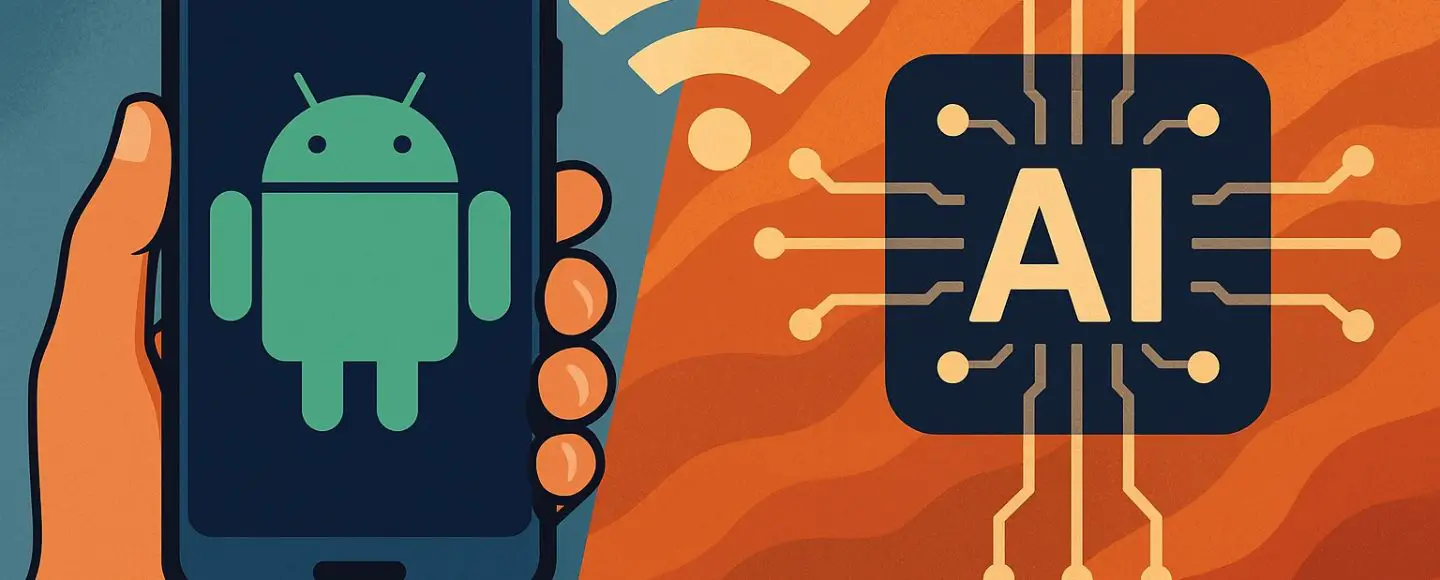Google launched Offline Fallline AI for Android
Google introduces Gemini Nano, its latest on-device AI model that brings Offline Falline AI processing to Android phone. This means that smart functions no longer depend on internet connectivity. Especially designed for Android devices, this development presents the main jump in the AI exhibition by running the work directly on the phone instead of using cloud servers. Real-time translation, sound summary and image generation become faster, more private and compatible. Initially, this feature is available on devices like Pixel 8 Pro and select Samsung models. This step improves consumption in lower-connectivity areas and strengthens Google’s position in mobile AI compared to Apple Pal and Samsung.
Key remedy
- Gemini Nano delivers Offline Falline AI features on Android, processing the functions without sending user data to cloud servers.
- Pixel 8 Pro and selected Galaxy Phones are the first supported devices.
- On-device accelerates AI speed, increases privacy, and guarantees efficiency in areas with weak or no internet with cess.
- These efforts mark a significant entry of Google in the AI AI, competition with the neural engine of Apple Pal and Samsung’s Galaxy AI platform.
Also Read: Apple Pal’s innovative intelligence structure unveiled
What is Gemini Nano and how does it work?
Gemini Nano is a Google Lightweight AI model designed to work directly on mobile devices. It works using a system, a system service that links Android’s operating netting system to the phone’s AI hardware. Instead of relying on external servers to handle the user input, Gemini Nano processes data internally. This leads to the ability to function without a rapid work performance, enhanced privacy and any kind of connectivity.
The model is designed for efficiency when protecting battery life. It reduces ENERGY zoning consumption by avoiding continuous communication with external servers. As a result, users receive real-time feedback when using features such as Voice Is Note Summary, Speech Translation or Image Generation, even when the device is offline.
Offline Falline A.I. Cases of real-world use for
Gemini Nano enhances daily phone functions by giving AI capabilities an offline. Here are examples of how users benefit:
- Live translation while traveling: Understand foreign icons, menus and conversations without using mobile data or Wi-Fi.
- Safe Message Summary: Summarize long texts or emails without uploading the material on the server.
- Local Photo S -Ing Routing: Identify and classify the user data, on the basis of reference or scenes, keeping the data private.
- Summary of Offline VOICE Note: Ask the phone to produce a summary of meetings or memo even when Airplane Mode is active.
These updates make AI more accessible to data limitations or people dealing with incredible Internet service.
Supported devices and system requirements
Gemini Nano currently supports two types of devices: Google’s Pixel 8 Pro and Special Samsung Galaxy Flagships. These devices include chips like Tancer G3, which allow AI models to work effectively without external assistance of GPU or cloud servers. Google said it plans to support more partners during 2024. This expansion will provide extensive provide cess to the Offline Fallline AI on the Android platform.
Google is also introducing an API for developers. This app enables creators to include Gemini Nano features in their applications using local processing, which opens the door for user-first applications in communication, media and productivity.
Why is the on-device AI faster and more private
The AI functions completed on the phone improves both motion and privacy. The user data remains on the device, avoiding delays and risks of cloud processing. A Google representative has reported that “-n-device processing reduces delays by up to 40 percent compared to the regular summary and cloud estimate in translation tasks.”
Cloud AI systems increase the privacy flag as they often send user activity at data centers for analysis. On the contrary, Gemini Nano allows sensitive content, including personal messages or photos, to be processed privately in the phone. This is especially beneficial for anyone who emphasizes data protection or works in a safe environment.
Google vs Apple Pal vs Samsung: AI Comparison
The introduction of Google’s Gemini Nano introduces a new competition for Apple Pal’s neural engine and Samsung’s Galaxy AI Toolkit. Review the following comparison to see how the platform is different:
| Attribute | Google Gemini Nano | Apple engine | Samsung Galaxy A.I. |
|---|---|---|---|
| LINE | Yes | Yes | Yes |
| Cumulative | Yes | Limited | Somebody |
| Image | Limited (with Gemini Pro) | Somebody | Somebody |
| Developer | Available by Acre | Limited | 2024 comes |
Apple Pal made a way with AI hardware, but Google’s flexible Gemini setup allows faster updates. Pixel users already experience strong voice feedback and language support. This flexibility is located to provide one of the most advanced Offline Falline AI features available to Google today.
Also Read: Google Gemini AI unveils innovative memory facility
Expert Perspective: The Rise of Edge AI
The movement towards the Offline Falline AI represents the ER -Banda investment in the same computing. David Burk, Android’s VP, said in the latest presentation that “allows the consolidation of the AI AI experiences to the Operating Perating System, without compromising the battery life or user trust.”
Tech experts say that supporting local AI processing is the key to the future of Android. Governments and privacy groups are demanding better control over user data. Google’s decision to emphasize Google Fallline AI development reflects the comprehensive trends of user defense and sustainable influence. Gemini Nano addresses those needs by making mobile devices smarter and safer.
Also Read: Play AI locally on Windows 11
User accessibility and future effects
The Offline Falline AI expands access to access to areas where Internet service is limited or expensive. This local display will benefit the most relevant users about passengers, rural communities and data limit. With Gemini Nano, Google is promoting AI that is not always dependent on connectivity. This users reflect built strategic hardware and S. Software Fatware innovation to prefer Ibility Cessibility and Privacy.
During the Android 14 Lifestyle and future updates, ER Banda Gemini Nano is expected to touch Voice Issue commands, forecasting equipment and image processing. As application manufacturers start using across, users will get such tools both intelligent and elastic in low-signal situations.
Visual Guide: Cloud AI vs on-device AI
On-Device AI: Locally user data processes to deliver faster and more secure results.
Cloud AI: Remote sends data to remote servers for the process, which can delay the tasks and increase the concern of privacy.
Also Read: Google launched Gemini 2 and AI Assistant
Conclusion: A close, smart Android experience
Gemini Nano brings more than new processing power. It reflects Google’s shift towards the responsible, accessible AI design. Android smartphones become reliable tools for daily assistance by working locally. Gemini Nano determines the foundation of Android’s next chapter in mobile intelligence, as privacy, speed and reliability strengthen.




